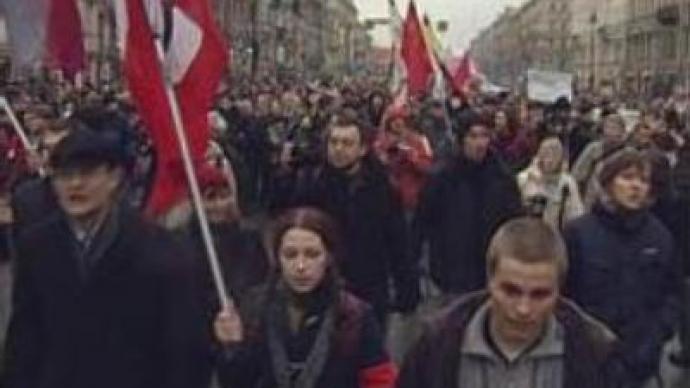Dozens detained in police clash with protesters in St. Petersburg

Hundreds of people have voiced their opposition to the Government at a rally in St. Petersburg. The peaceful demonstration has been marred by clashes between activists of radical youth groups and police which broke out after the rally ended.
About a hundred of protesters have been detained after they tried to break a police cordon in an attempt to hold an unauthorized rally. A “March of Disagreement” rally has been held in St. Petersburg, Russia’s second largest city. Around 18 organisations were supposed to take part in the protest. Although local authorities sanctioned the rally, members were banned from marching along the streets. As the authorities of Saint Petersburg braced themselves for this March of Disagreement, they clearly remember the previous one. In March a similar rally gathered up to 5,000 people marching under the flags of the Other Russia – a coalition of movements opposing the Kremlin.But this time less than 2,000 people came to Pionerskaya Square in central Saint Petersburg to protest against the president and the governor’s policies. And this was about the only thing uniting them. The crowd cheered as politicians from the liberal Yabloko party and the leader of the National Bolsheviks accused President Putin of establishing a police state and reducing civil rights and freedoms. “The only purpose of a state is to serve its citizens. And our authorities think we’re here to serve them. And the elections in our country aren’t real any longer, it’s just a mere formality,” says Aleksey Ivanov, protester.“I want us all to have freedom, to have the right of elect and choose governors, I’m against appointments. And that’s my second call: against the construction of a Gazprom office skyscraper in this city,” says Irina Aleksandrova, protester.In fact, many of the protesters were showing their discontent with the governor of Saint Petersburg and the intense construction works planned in the city. “As new residential buildings are being constructed in our neighborhood, just in between kindergarten and school, we will inhale all the dirt and dust, and our children will be in risk,” says Maria Stepanova, protester.Yet others say they came just to fight for their right to protest.“It’s not really important for me, what to protest against. What’s really important is to show that we do need and do use our constitutional right for political rallies. Otherwise in a couple of years even this might become unavailable for us,” says Sergey Loginov, protester.Thousands of riot police officers and Interior Ministry troops were brought to the site of the rally. The entire area was cordoned off by double fences and a police helicopter flew over the square, monitoring the crowd. Disagreement marches in Russia are following each other in a row. But this rally in Saint Petersburg has gathered much less protesters than the previous one on March, 3rd. In the meanwhile, the authorities are seemingly learning their lessons and here the presence of security forces is impressive. There are more police officers than protesters. In March, security forces couldn’t contain the thousands of demonstrators who marched through the streets of Saint Petersburg clashing with police. But this time the rally was relatively calm in comparison. Only after it was over, as police tried to channel the participants to the nearest metro station, some tried to break the cordons. Up to one hundred activists were detained. Soon, the streets became empty and traffic resumed its flow. Most of those walking by hadn't even heard about the rally. And not everyone would have joined in with it even if they had known in advance. “I don’t support them. I believe it’s all orchestrated from abroad, by those who want to stop the development of our country,” says Aleksandr Vasilevich, Saint Petersburg resident.“I wouldn’t protest against Putin or governor Matvienko. They’re about the first politicians who do something real for us. And all these protesters should work, not hang around, if they want to help,” says Kirill Zvezdny.Compared to the previous March of Disagreement this latest one seems to be much less successful for the Other Russia. But the movement will certainly will keep trying ahead of the elections planned fro December. On Saturday, thousands took part in a number of demonstrations in Moscow. Both opposition and government supporters expressed their views. Some 9,000 policemen were pulled in to prevent any disturbances. 170 people were detained for various violations. Opposition groups staged a city-centre “March of Discontent” to protest against what they call the “squeezing” of democratic freedoms in Russia.' But the largest rally of the day, called “the March of Agreement”, was organised by government supporters. Rallies were sanctioned in 6 locations across the city, but opposition leaders also gathered their supporters in an unauthorised rally at Pushkin square. At the same time, at least 600 supporters of pro-nationalist movements were holding a demonstration of their own in the Russian capital. The two-hour rally in one of the city's central squares was officially authorised. It was organised by the Movement against Illegal Migration and the Congress of Russian Communities, which claim to protect the interests of Russians. According to the organisers of the demonstration its aim is to draw attention to what they call pressing economic and social concerns. Earlier, the mayor of Moscow had warned that while authorities have nothing against rallies, displays of chauvinism, xenophobia, and racial and ethnic hatred would not be tolerated. Meanwhile, former Italian Prime Minister Silvio Berlusconi says reports about the opposition rally in Moscow have been blown out of proportion. This statement comes after Berlusconi’s meeting with President Putin in St. Petersburg. Silvio Berlusconi stressed that the opposition supporters were outnumbered by supporters of the government, and that those who were detained had attempted to defy a ban issued by the authorities. He also insisted that Russia does believe in democratic values.
You can share this story on social media:












